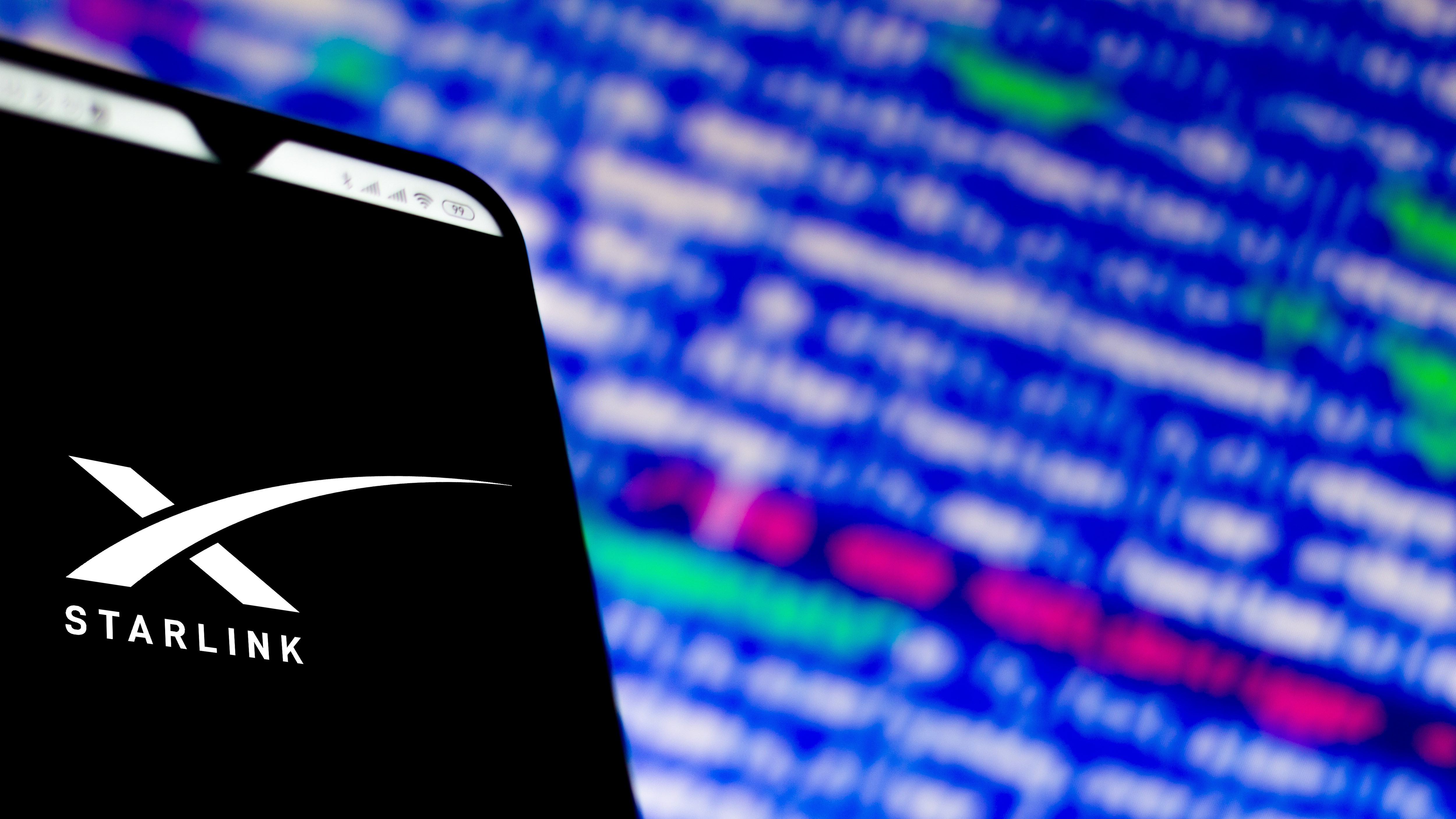Starlink internet coverage, cost, speeds and the latest news — what you need to know
Elon Musk’s Starlink satellite internet service is seeing rapid speed gains and increased adoption

Elon Musk’s satellite internet company Starlink is already approaching broadband speeds. Actually, Starlink Premium, a new higher-end tier, surpasses some of the best broad speeds available in the U.S., albeit, at an absurdly high price.
While it’s still somewhat early on, Starlink is already having an impact on people living in rural parts of the world. In our Starlink review, we were thoroughly impressed by the new satellite internet service but there are still lots of questions and variables that need to be taken into account.
SpaceX has also launched Starlink RV which is a service meant for users on-the-go or who live in campers. While you can skip the line and get Starlink's RV plan instantly, there is a downside though as network services are de-prioritized for Starlink RV compared to other Starlink products – which means a degraded service and slower speeds.
So far, SpaceX has launched more than 6,900 Starlink satellites with new launches scheduled quite frequently. These satellites will continue to help cover the continental U.S., Canada and the U.K. At the same time, NASA and SpaceX have come to an information-sharing agreement to help avoid orbital collisions.
SpaceX also revealed its next-gen Starlink V2 Mni satellites which now use the E-band for backhaul. This will allow Starlink to provide four times more capacity per satellite compared to its previous iterations.
Starlink is also moving beyond providing satellite internet as SpaceX is also working on a Direct-to-Cell service that will start with text messages first before moving on to actual phone calls. In fact, the company sent out its first text messages at the beginning of 2024.
You can currently order Starlink, which promises to deliver broadband speeds of up to 300 Mbps to anyone in the world regardless of where they are. Whether it be a rural farm in Iowa or a remote village in Canada, customers are reporting greatly improved internet speeds with Starlink.
Sign up to get the BEST of Tom's Guide direct to your inbox.
Get instant access to breaking news, the hottest reviews, great deals and helpful tips.
SpaceX is continuing to launch more satellites and service is already reaching more parts of the continental U.S., Canada and parts of Europe. We now have an even better indication of how rollout is going, thanks to a new coverage map.
But what is Starlink? Below you'll find a rundown of this project that aims to get everyone in the world connected to high speed internet.
Latest Starlink news (updated February 3)
- Starlink is officially compatible with Apple devices, allowing you to connect to its services from anywhere using your phone.
- Starlink now offers a backpack-sized "Starlink Mini" dish that you can carry anywhere to extend your coverage.
- Starlink has introduced a $100 congestion charge to some areas of the United States with overcrowded networks, as well as a $100 credit for users in areas with "abundant network availability."
Starlink release date
Starlink officially exited beta two years ago, but it’s currently only available in select regions and countries. However, the company plans to make its satellite internet service available worldwide soon.
As of right now, Starlink is available in 87 countries, including the United States, Canada, Mexico, Australia, and most of Europe and South America. Recent pushes into Africa and the Middle East have made the service available in a handful more countries, including Zimbabwe and Yemen. Starlink has a full map of availability, including soon-to-be network members and countries with a waitlist, on its site.
Back in May of 2022, Starlink completed its first deployment in Asia by launching in the Philippines. After making preorders available in India in October, 2021, the company’s Sanjay Bhargava revealed that the Indian government had halted pre orders until SpaceX received the regulatory approval in the country.
While it’s still difficult to get Starlink satellite internet coverage at the moment, a filing with the FCC in May of 2022 revealed that the service already has over 400,000 subscribers. If you live in an area that’s currently unsupported, you can still order Starlink on the company’s website to hold your place in line. Once the service expands to more areas this year, you’ll receive a notification that your Starlink is ready to ship.
Even if you have no plans to use Starlink as your home internet provider, you will soon be able to use the service’s satellites with your smartphone. However, that service may not become available until the beginning of next year. T-Mobile CEO Mike Sievert announced in August 2022 that the mobile carrier would work with SpaceX on a plan to provide its customers in the continental U.S. with universal text coverage. Unfortunately, in a recent interview with CNBC, Sievert said that the testing "could start late this year or early into next year"—a slight adjustment from the timeline SpaceX gave the FCC this May, which said that the program would be live this fall.
Starlink price
Starlink preorders currently cost $120 a month, and the service will require an up-front hardware fee of $499. That includes the small satellite dish that can be set up at a home or business, as well as a router and power supply. There's also a shipping and handling fee of $50.
Starlink's Standard service now costs $120 per month for 24-220 Mbps. Meanwhile, its Business plans are available in three different packages: Priority 40GB for $140 per month, Priority 1TB for $250 per month and Priority 2TB for $500 per month.
If you want to use Starlink on the go, then you're going to need one of the company's Land Mobility packages which offer 40-220 Mbps. Mobile Priority 50GB costs $250 per month, Mobile Priority 1TB costs $1,000 per month and Mobile Priority 5T costs $5,000 per month.
SpaceX has now rebranded Starlink RV as Starlink Roam. It's available in two different versions, one costs $150 per month and is intended to be used regionally while the other can be used for global roaming for $200 per month. Regardless of which option you choose, the dish itself still costs $599. To get top speeds, it's a good idea to pair Starlink with one of the best Wi-Fi routers.
Depending on location, new users will also have to pay a $100 congestion fee. Starlink has not provided a clear outline of which areas will be affected by this extra charge, but new users will be notified that this pricing applies to them prior to checkout.
On the other hand, new U.S. users who live in areas with lower-than-average usage can receive a $100 credit called "Regional Savings." Likewise, new Canadian users can score a credit of $200 CAD if they fit these conditions.
What Starlink users are saying
The response to Starlink's internet service has been overwhelmingly positive from the few customers receiving service. Head on over to the Starlink subreddit, and you'll find users posting images of their new satellites, with accompanying speed tests. In Missouri, users are reporting download speeds of 150 Mbps. Another user in Idaho uploaded 72 hours worth of test results, and found speeds to be an average of 71 Mbps.
A user in the U.K. saw a massive leap in internet speed after installing Starlink. Aaron Wilkes from Kent, went from 1 Mbps to 175 Mbps. While Wilkes is paying more for Starlink, he feels the price is worth it.
"The ability to be able to download content so quickly compared to our standard BT line is amazing,” said Wilkes in an interview with the PA news agency.
Mega popular YouTube channel Linus Tech Tips was also able to procure a Starlink satellite system. They were able to stream four 4K videos at once and successfully played through a game of Counter-Strike: Global Offensive with little issue.
And director Jesse Senko, who lives in a rural Ontario, Canada, detailed how Starlink massively upgraded his workflow in the video below.
Starlink specs and IPO
Unlike other satellite internet providers, Starlink's LEO satellites promise to offer low-latency broadband speeds regardless of where you are. While Starlink was first boasting speeds of 1 Gbps, it's since upped that target to 10 Gbps. To put that into context, users would be able to download a 4K movie in less than 30 seconds. Starlink would be a major boon for people living in rural parts of the world.
Speed test analysis by Ookla shows Starlink seeing major gains in speed in the past few months. Median download speed has jumped from 65.72 Mbps to 97 Mbps. Actually, Starlink is creeping up on average median broadband speeds of 115.22 Mbps. The second leg of the Starlink network should see even faster speeds,
Latency on Starlink is surprisingly low considering its satellite internet. Early beta tests show that Starlink averages 34 milliseconds. While that may not be as fast as fiber, which can get as low as 17ms, any latency under 40ms is solid for most applications. Certain types of online games, most notably shooters and fighting games, benefit most from low latency. But sports games or MOBAs will work well on Starlink. Musk has admitted as such, aiming to bring pings down below 20ms.
It goes without saying, Starlink absolutely destroys other satellite internet companies like HughesNet and Viasat. Both offer download speeds at a fifth of Starlink with latency that's ten times higher.
Because of this, it's no surprise that OneWeb (half-owned by the UK government), Amazon's Project Kuiper, Boeing, Telesat, and the Russian and Chinese governments are all planning satellite internet constellations.
Still, getting a project of this magnitude literally off the ground and into profitability is a monumental task. While the Russian and Chinese governments can bear the brunt of the cost, companies like Starlink and Amazon take on significant risk. Past satellite internet constellations have gone bankrupt.
There's also a lot of interest in when a Starlink IPO would go live. In a tweet, Musk replied that an IPO is planned, but it would come after SpaceX has a more predictable cashflow. For Musk and Starlink, the goal right now is not to go bankrupt.
Starlink from your iPhone?
A perk included in the newest iOS update, iOS 18.3, introduced Starlink satellite access to iPhones without the need to point your phone at the sky for a connection.
This part of the latest update was included somewhat as a surprise, but it's one of the most significant tech collaborations in the past year, and it represents a major stride forward for SpaceX's budding technology. This is also a major step for Apple users, because Starlink cellular access was originally a Samsung exclusive.
At the moment, this new connection will only enable Starlink users to text from anywhere, and it's still only in beta testing for select users, but SpaceX intends to develop its call and data coverage to eventually supplement its text-from-anywhere capabilities.
Starlink in your Tesla?
It seems that SpaceX has made a request with the Federal Communications Commission to bring Starlink satellite internet service to jets and ships. In a letter to the FCC by SpaceX director of satellite policy, as acquired by CNBC, David Goldman states, "This application would serve the public interest by authorizing a new class of ground-based components for SpaceX’s satellite system that will expand the range of broadband capabilities available to moving vehicles throughout the United States and to moving vessels and aircraft worldwide."
The company would handle vehicle installation through "qualified installers" and cited the need for quality internet "while on the move."
SpaceX has also made a second filing with the FCC regarding a more rugged satellite dish, one that can handle moving conditions or more extreme climates. Already, Starlink satellites are shutting down in extreme heat, forcing users to water their "Dishys" like they would flowers.
There is the issue of internet access varying between countries. Some countries, like China, have a strictly controlled internet infrastructure. Sites that might be okay to view in the U.S. likely would not be in China. But this is satellite internet, meaning it can be accessed from anywhere. It seems that Starlink will default to the rules of the country you're in, "whichever is more constraining."
This is all academic right now, though. Because of the size of the Starlink satellite terminal, at the moment it will not be possible on cars. Elon Musk stated so in a tweet.
Starlink on your back?
Starlink has officially released a backpack mount for its Starlink Mini dish, known as Starlink Roam. It allows you to carry the dish anywhere and maintain coverage.
The up-front cost for this service is $599, and you can opt for two data packages depending on your needs. For light and infrequent travel, you can opt for a limited 50GB plan for $50 a month; alternatively, if you want to work remotely on the regular, you can choose an unlimited plan for $165 a month.
Starlink outlook
Given that broadband companies lack rivals in many cases, Starlink and other satellite internet constellations are a welcome injection of competition. More important, the service enables regions to get connected at broadband speeds where there were no options previously.
For example, the Hoh Tribe, a Native American tribe located in Western Washington state along the Pacific coast, said Starlink was like being "catapulted into the 21st century." Per the Newsweek article, the Hoh Tribe tweeted that faster internet speeds helped with remote learning and access to healthcare.
Starlink's wireless nature allows it to enter any part of the world, subverting the need for cables. By doing so, rural areas that remain neglected can now be connected at broadband speeds. The standard cost of $120 is still too high for many parts of the globe, but given that Starlink will see competition from other companies, prices will likely drop over time.

Adam Schram is a staff writer covering home office gear for Tom's Guide, writing about everything from standing desks to comfy chairs to the occasional walking treadmill. Prior to his tenure with the team, he reviewed running gear for Runner's World, cycling gear for Bicycling, and the occasional Lego set for Popular Mechanics. Before he became a journalist, he was a bike mechanic in his home town of State College, Pennsylvania for almost seven years. Now, he's based in Philadelphia. He spends his free time ripping his bike around local trails, perusing the local music scene, and trying in vain to do the Sunday crossword without cheating.
-
mlhutche Reply
Happy to see competition, but I don't see how anyone can beat SpaceX, with brilliant engineers and their own rockets which are the lowest cost in the industry. If Starship is successful it's game-over for lowest cost space launch.admin said:Star is Elon Musk's ambitious satellite internet service that promises broadband speeds anywhere in the world with new satellites being launched regularly. Here's everything you need to know.
Star internet coverage, speed, cost, satellites, IPO and latest news : Read more
Similar to Tesla, where no one can match their combination of price and capability. Some nice cars, but all inferior on balance because Tesla does it less expensively.






